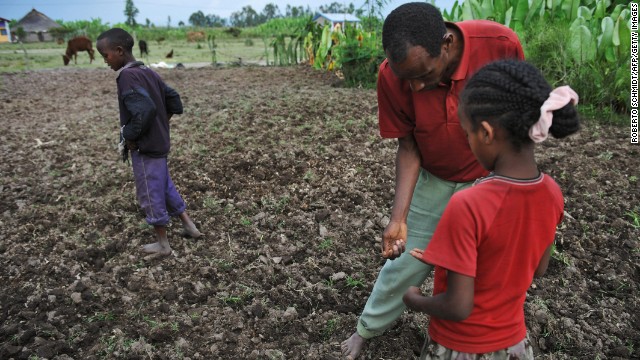 A farmer and his children plant a field with bean seeds and fertilizer in southern Ethiopia in 2008, a year after severe floods in the country destroyed most of the food crop. Ethiopia is the 10th most vulnerable country to climate change impacts,
A farmer and his children plant a field with bean seeds and fertilizer in southern Ethiopia in 2008, a year after severe floods in the country destroyed most of the food crop. Ethiopia is the 10th most vulnerable country to climate change impacts,The long, slow process of climate change may trigger "surprise" shifts that could threaten human communities in years or decades, researchers from the National Academy of Sciences warned Tuesday. In a 200-page report, the scientists call for an early-warning system that would watch bellwethers like Midwestern aquifers, Antarctic ice sheets and tropical coral reefs for signs that a "tipping point" is coming. Accelerated environmental changes can already be seen in the loss of Arctic sea ice and bigger wildfires since 1980, the authors said. "A lot of these things require not only monitoring what's going on out there in the natural world as well as monitoring what we do in the human-built environment as well; how much dollar-wise do we have at risk?" said Jim White, who led the committee that produced Tuesday's report. The committee didn't calculate the cost of establishing an early climate warning network. But even in a time of tight budgets, White said, the cost would be "trivial compared to the cost of the assets at risk." Media's global warming fail Photos: Climate change and human conflict Photos: Climate change and human conflict Follow CNN Science News Facebook: CNNScience Twitter: @CNNLightYears "We have trillions of dollars of infrastructure in cities along the coast alone," said White, a geochemist and paleoclimatologist at the University of Colorado. When a bank wants to protect the money in its vaults, "You don't crab about how much the cameras cost," he said. But, he added, "at a time when we should be understanding more and observing more about our environment, we're actually observing less." The idea of long-term climate change driven largely by the use of fossil fuels, which release heat-trapping carbon dioxide emissions into the atmosphere, is controversial politically but accepted as fact by most researchers. The concentration of heat-trapping carbon dioxide hit a concentration unseen since prehistoric times at the benchmark Mauna Loa observatory in May, and scientists reported in 2012 that the ice sheets covering Greenland and Antarctica were losing mass at an accelerating rate. Tuesday's report states that there's a high risk of increased extinctions of land and sea life and the disappearance of the Arctic icecap in summers within this century. There's a moderate risk of increased heat waves, a decline in ocean oxygen levels and rapid changes to ecosystems that would threaten food and water supplies, the scientists note. Watching for those symptoms would give communities that depend on those ecosystems the ability to adapt, White said. City-size iceberg drifts from Antarctica And there's a "probably low" but unknown risk that warmer rising seas could undermine the ice sheet that covers western Antarctica, raising average sea levels far more and more quickly than the roughly 1 meter (3 feet) they're now projected to increase by 2100. That would make it much harder for coastal cities like Miami, which is already seen as the U.S. city most vulnerable to climate change, to adapt in time. "Warm water, as one could imagine, is the enemy of ice, and we don't monitor ocean currents and ocean temperatures near the ice sheet nearly as much as we should," White said. Other feared effects -- such as the sudden release of large volumes of methane from thawing Arctic tundra or the disruption of the Atlantic Ocean currents that carry warm water into the northern latitudes -- were given a low chance of occurring on a rapid scale. That's not to say that they won't happen, just that they're likely to happen gradually, White said. Global average temperatures are up about 1.5 degrees Fahrenheit (0.8 degrees Celsius) since the 1880s, according to NASA. The United Nations has been trying to get member nations to reduce carbon emissions enough to limit warming to 2 degrees C (3.6 F). But in a paper published the same day as the National Academy's report, NASA's former top climate scientist warned that a 2-degree increase would still inflict "irreparable harm" on future generations. "These growing climate impacts, many more rapid than anticipated and occurring while global warming is less than 1 degree C, imply that society should reassess what constitutes a 'dangerous level' of global warming," James Hansen, now the head of the climate science program at Columbia University in New York, wrote in the online, peer-reviewed scientific journal PLOS One. Continuing to burn fossil fuels at today's rates "would be an act of extraordinary witting intergenerational injustice," Hansen and his colleagues concluded.

No comments:
Post a Comment